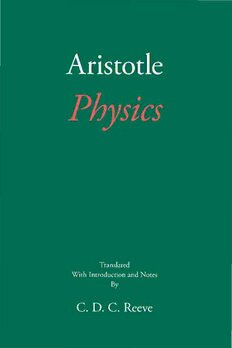
Physics PDF
Preview Physics
Aristotle Physics Aristotle Physics Translated With an Introduction and Notes By C. D. C. Reeve Hackett Publishing Company, Inc. Indianapolis/Cambridge Copyright© 2018 by Hackett Publishing Company, Inc. All rights reserved Printed in the United States of America 21 20 19 18 1 2 3 4 5 6 7 For further information, please address Hackett Publishing Company, Inc. P.O. Box44937 Indianapolis, Indiana 46244-0937 www.hackettpublishing.com Cover design by Deborah Wilkes Interior design by Elizabeth L. Wilson Composition by Aptara, Inc. Library of Congress Cataloging-in-Publication Data I Names: Aristotle. Reeve, C. D. C., 1948- Title: Physics I Aristotle ; translated, with an introduction and notes, by C. D. C. Reeve. Other titles: Physics. English Description: Indianapolis: Hackett Publishing Company, Inc., [2018]1 I Series: The new Hackett Aristotle Includes bibliographical references and indexes. I Identifiers: LCCN 20170400301 ISBN 9781624666919 (pbk.) ISBN 9781624666926 (doth) I Subjects: LCSH: Science, Ancient. Physics-Early works to 1800. Classification: LCC Q15l.A7 R44 20181 DDC 530-dc23 LC record available at https://lccn.loc.gov/2017040030 Adobe PDF ebook ISBN: 978-1-62466-693-3 For W. E. W. St. G. C. & All at TLG. Contents Preface xiii Abbreviations XV Introduction xix Physics Book I I 1 Scope and method of natural science. 2 12 Its starting-points. The views of Parmenides and Melissus. 2 13 Their arguments refuted. 5 14 An examination of the views of the physicists. 7 IS The starting-points are contraries. 10 16 Are they, then, two or three in number? 11 17 Our own account. 13 18 A puzzle of the ancient thinkers solved. 16 19 More on starting-points. 18 Book II II 1 What nature is and what it is to be by nature. 20 II 2 Natural science distinguished from mathematics and first philosophy. 22 II 3 What sorts of causes there are and what way they are causes. 24 II 4 Puzzles raised about the existence ofluck and chance as causes. 27 IIS Luck and chance and the way they are causes. 28 vii Contents 116 Luck and chance defined and distinguished. 30 117 The natural scientist should know all four causes. 32 118 Does nature act for an end? 33 119 The necessity present in natural things. 36 Book III III1 Movement. 38 III2 Movement again. 40 1113 Mover and moved. 41 III4 Views of the early philosophers on the unlimited. Reasons to believe that it exists. 43 IllS Criticisms of the views of the Pythagoreans and Platonists on the unlimited. 45 III6 The way in which the unlimited exists. 49 III? The various sorts of unlimited. The unlimited as matter (material cause). 52 IllS Refutation of arguments for the existence of something actually unlimited. 53 Book IV IV 1 The existence of place. 55 IV2 Is place matter or form? 57 IV3 Can a thing be in itself or a place in a place? 58 IV4 What place is. 60 IV 5 Puzzles about place solved and beliefs about it underwritten. 63 IV6 Views about the void. 65 IV7 What a void is. Refutation of arguments for the existence of a void. 66 viii Contents IV8 There is no void separate from bodies, or occupied by a body. 68 IV9 There is no void in bodies. 72 IV 10 Puzzles about time and views about it. 74 IV 11 What time is. The now. 76 IV 12 Various attributes of time. What it is to be in time. 79 IV 13 What now, at some time, just, recently, long ago, and suddenly are. 82 IV 14 Before in time. Time and the soul. 83 BookY V1 Classification of movements and changes. 87 V2 Classification of intrinsic movements. Immovability. 90 V3 Definitions of together, separate, making contact, intermediate, successive, contiguous, and continuous. 92 V4 What it is for a movement to be one in genus, in species, or unconditionally one. 94 vs Contrariety of movement. 97 V6 Contrariety of movement and rest, in accord with and contrary to nature. 98 Book VI VI 1 Every continuum consists of continuous and divisible parts. 102 VI2 Every continuum consists of continuous and divisible parts. 104 VI3 A now is indivisible and nothing is in movement or at rest in a now. 108 VI4 Whatever is moved is divisible. Modes of divisibility. The things that are similarly divisible: the time, the movement, the being-in-movement, the moving thing, what the movement is with respect to. 109 ix
